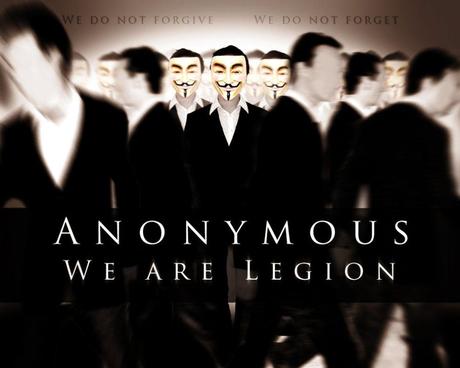I didn’t have high hopes when I went down to Frontline Club to see Brian Knappenberger’s We Are Legion, a documentary that promises to take the audience ‘inside the complex culture and history of Anonymous’. Films about politicised computer hackers are usually:
a) Boring, ridiculous propaganda in which hackers are presented as terrorists tearing down society.
b) Boring, ridiculous propaganda in which hackers are presented as heroes protecting society.
c) Boring, with a lot of information about programming languages and operating systems.
So I was delighted to find that We Are Legion is actually pretty good. Wearing its moderate bias on its sleeve, the documentary positions itself in the camp of ‘mainstream’ Anonymous members and distances itself from the more extreme factions. It’s a good call – it is easier to sympathise with a group taking on goliaths like The Church of Scientology and holocaust deniers like Hal Turner than with people who spend their spare time fucking with epileptics for kicks. The film offers a potted history of Anonymous’ roots and activities and then focuses on interviews with a selection of ‘former operatives’ including Mercedes Renee Haefer, the 20 year-old currently facing up to 15 years in jail for taking part in a distributed denial-of-service (DDoS) attack on Paypal (as a response to the company withdrawing its financial services from WikiLeaks). Haefer comes across as sweet, funny and smart, as do most of the spokespeople who show their faces in the film.
What Knappenberger really manages to convey is the playfulness of many Anonymous operatives (“like Freemasons with a sense of humour”according to one interviewee) and the decentralised system. One member compares the group to a flock of birds, explaining that you’re always free to fly in a new direction, and the flock – or some of the flock – might follow you. The diversity of the group’s motivations and characters also comes through very strongly in the film. From fiercely ethical, politicised activists to reactionary bullies and surreal comedians, Anonymous is presented as a loose affiliation of individuals rather than a structured group labouring under a shared set of well-defined beliefs. At times, it even seems to function as a dating service – one Anonymous member interviewed in the film gleefully recalls the young male virgins who finally got laid as a result of the Chanology protests (“There were a lot of hot girls there! You’d be surprised!”).

In a Q&A after the screening Knappenberger – speaking over Skype from the hospital where he’d just witnessed the birth of his first child – discussed his experience with Anonymous. He described the organisation as “a wide ranging group with wide ranging interests; geeks, hackers, punks and pranksters who have found themselves in the middle of one of the most important battles of our time – intrusion and surveillance in our lives”. The absurdity of much of the activity isn’t lost on Knappenberger. He points out that Project Chanology (Anonymous’ attack on Scientology) was ”a weird and bizarre situation in which you have a church created by a science fiction author being protested by people wearing masks created by a science fiction author.” However he sees the significance of the group as much greater than the sum of its parts. Activities like DDoS are creating new legal and ethical questions faster than anyone can answer them. “The Anonymous 16 defendants are facing 15 years in prison and $250k fine for what they would say is a virtual sit in which should a protected US First Amendment activity – maybe $250 fine and a night in prison. But no one knows where those lines are drawn, because it’s new” says Knappenberger. He points out that DDoS shouldn’t be straightforwardly condoned – the same methods that Anonymous used to protest Paypal and Scientology have been used by governments to shut down NGOs they don’t like.
One thing is certain. Theatrics aside, the battles for and with the Internet are on. Obama has described cyber attacks as America’s “most serious economic and national security” challenge while the discovery of Stuxnet and similar weapons indicate that cyber war is well underway on a global scale, though largely invisible.
Conflicts driven by ideology above geography pose complex threats to governments, as America’s War on Terror continues to prove. Similarly, ideological battles and affiliations online are fluid and prone to fluctuation, which can make them difficult to define, discredit or shut down. “The internet is insecure by design so there’s always going to be a certain amount of chaos to it” says Knappenberger.
In terms of Anonymous, Knappenberger sees “numbers gaining exponentially and changing and altering in really interesting ways”. He predicts the future will see the group focusing on issues of privacy and government / corporate surveillance, issues which make them “rise up most powerfully and forcefully”. Whether Anonymous will find a unified voice or continue as a raggle-taggle swarm is unknown. Perhaps their power is in the very lack of unity which makes them so difficult to define, to reduce and to destroy.
We Are Legion: The Story of The Hacktivists is currently screening at one-off events around the world. You can read more about the film, find out about upcoming screenings and keep track of aggrigated hacker news at wearelegionthedocumentary.com

